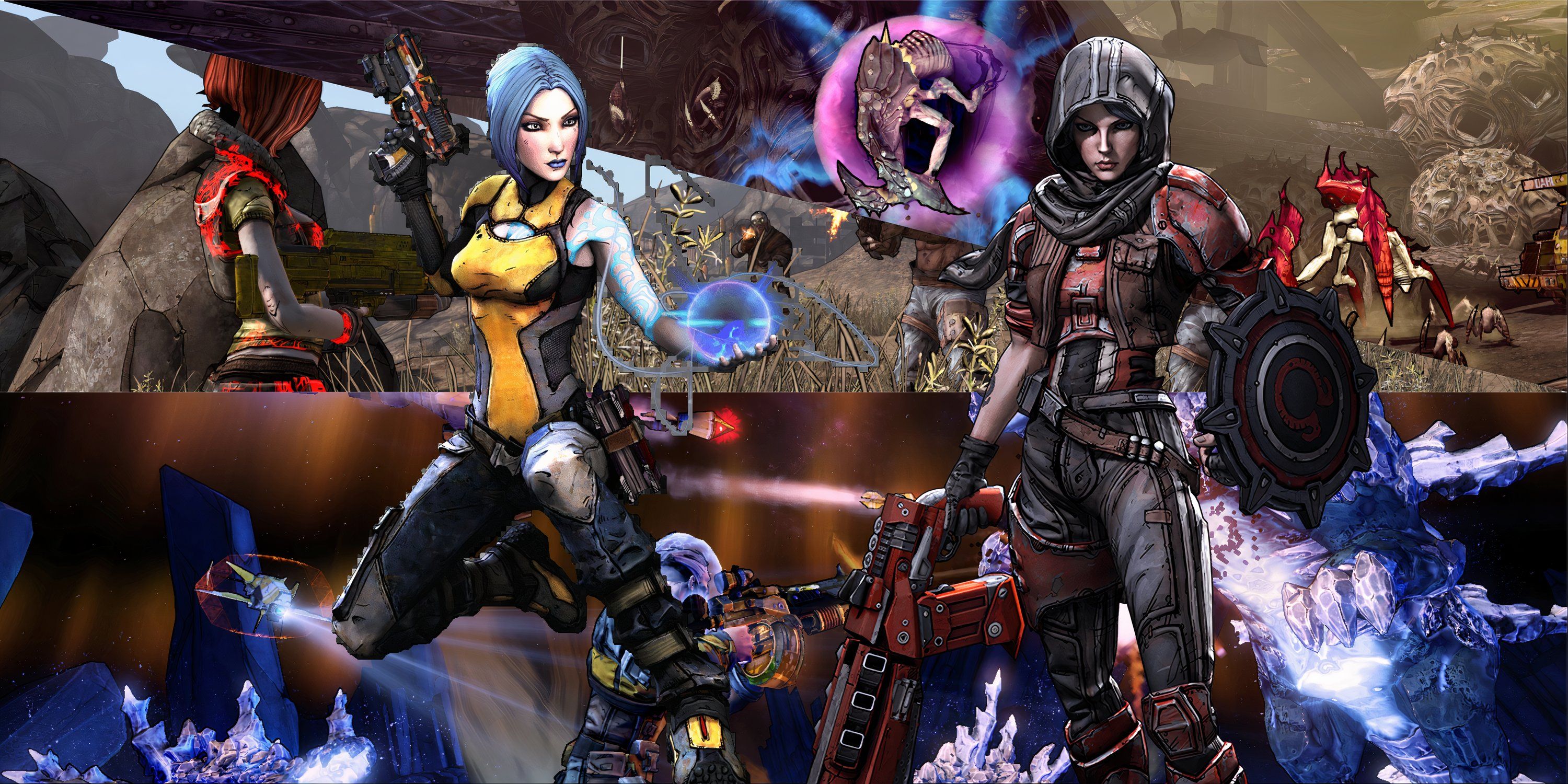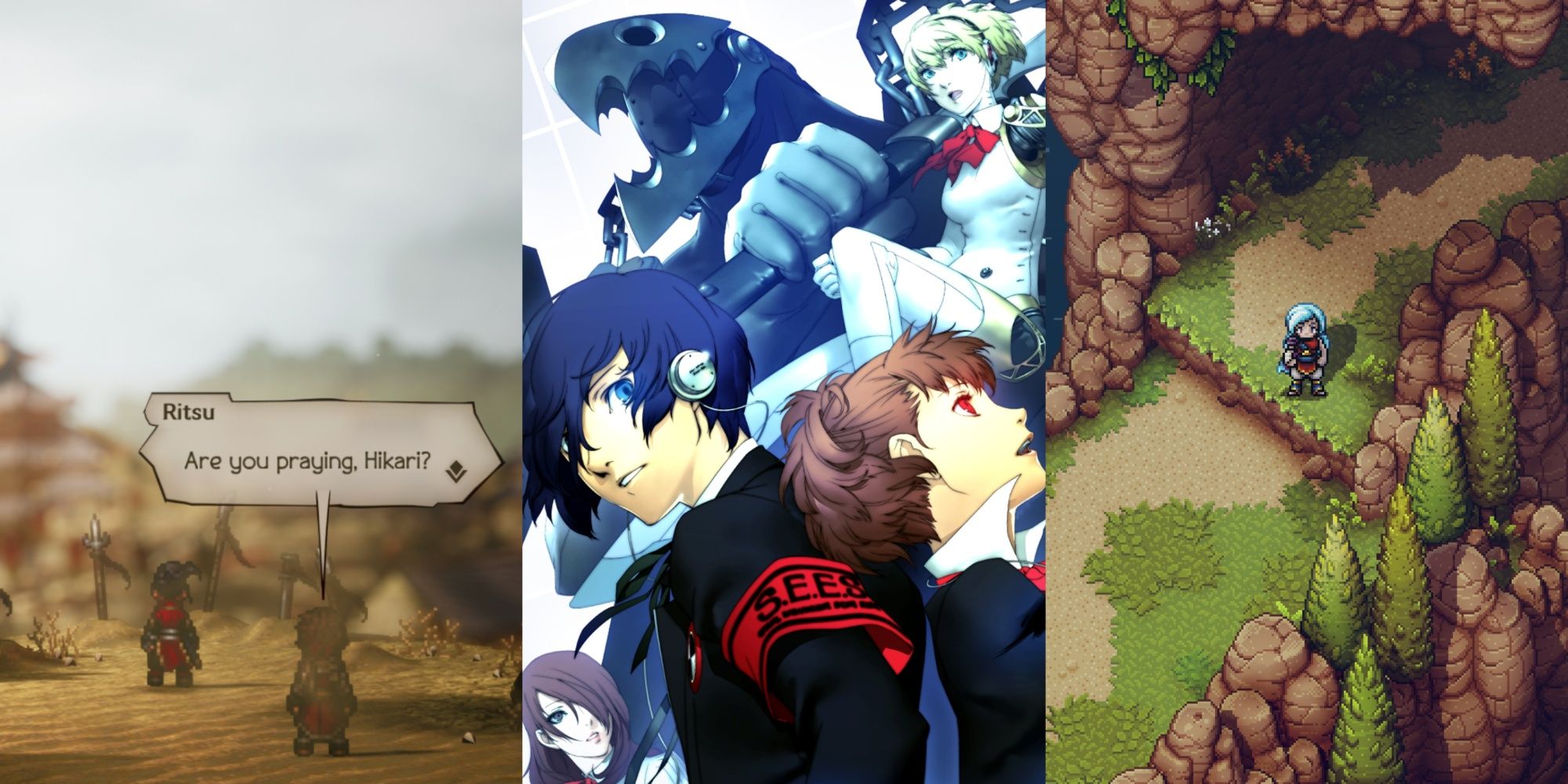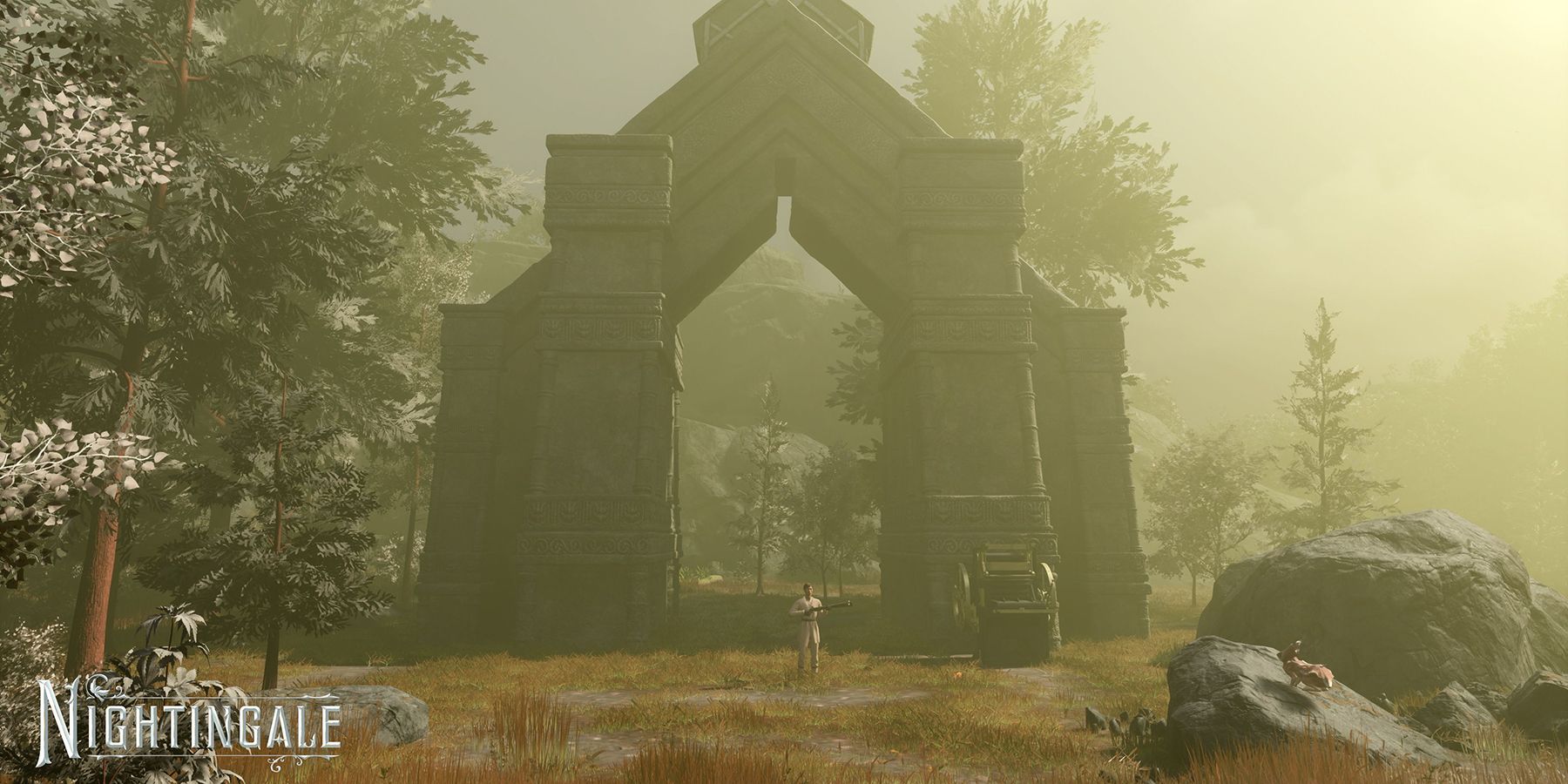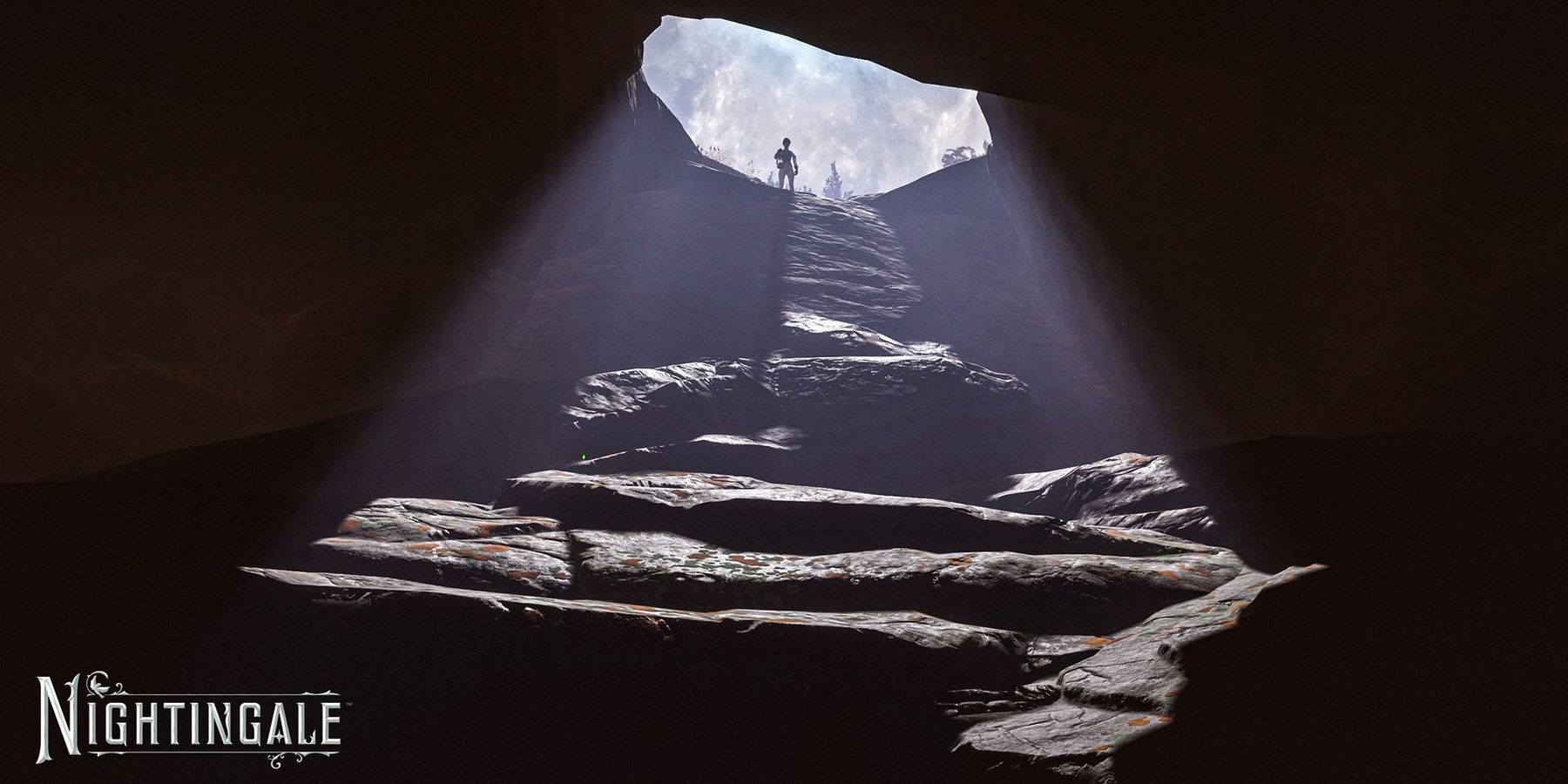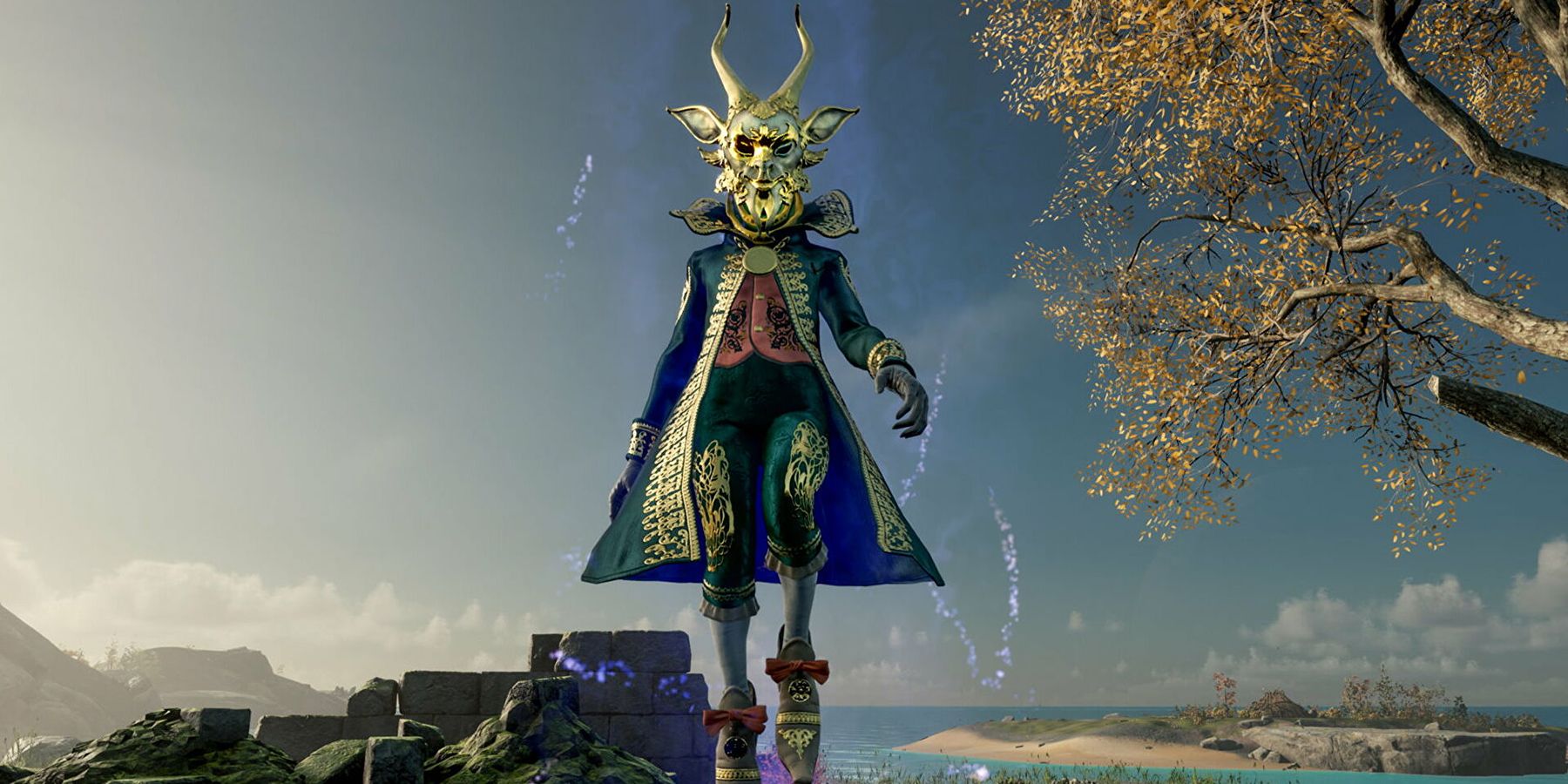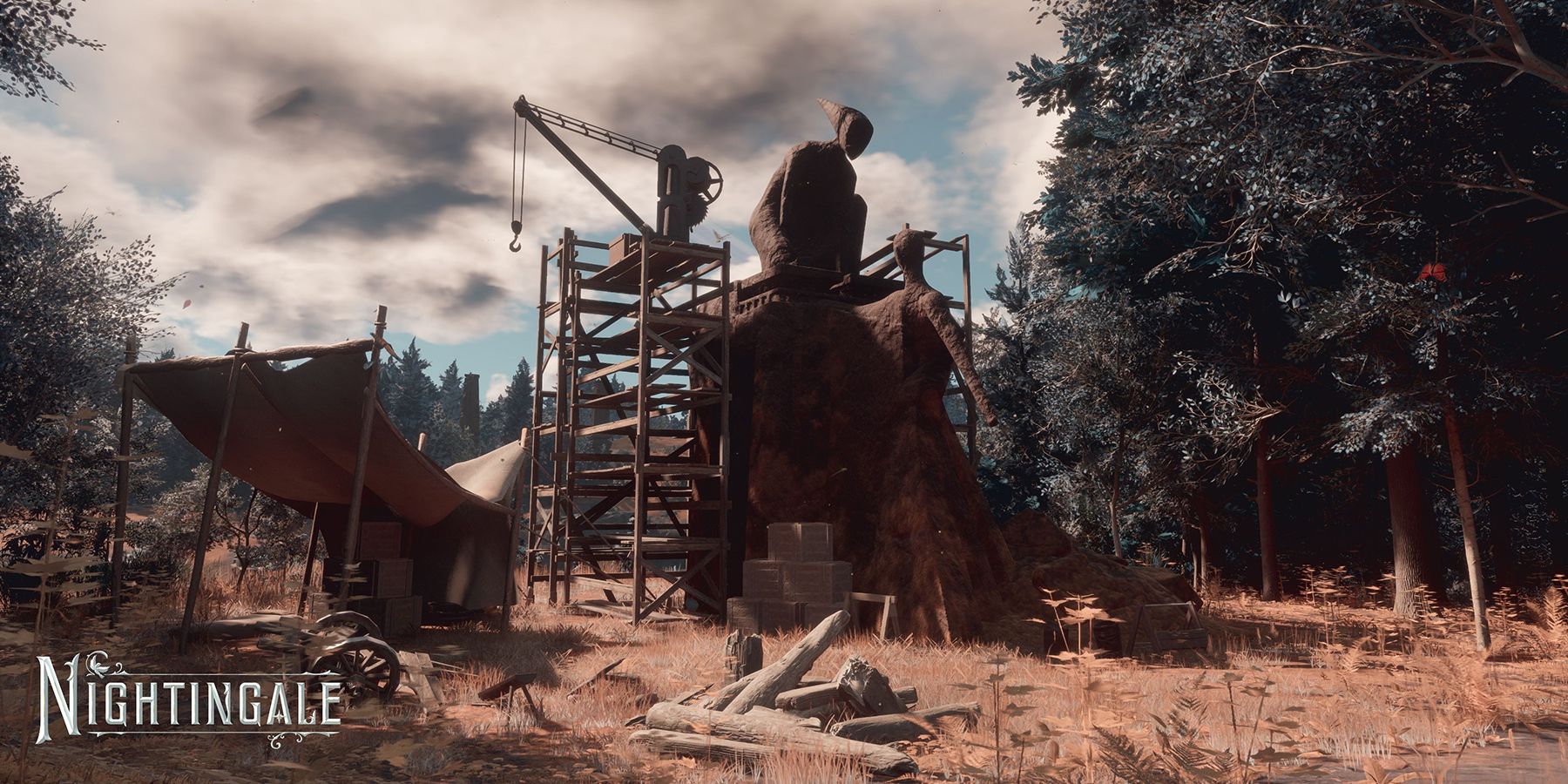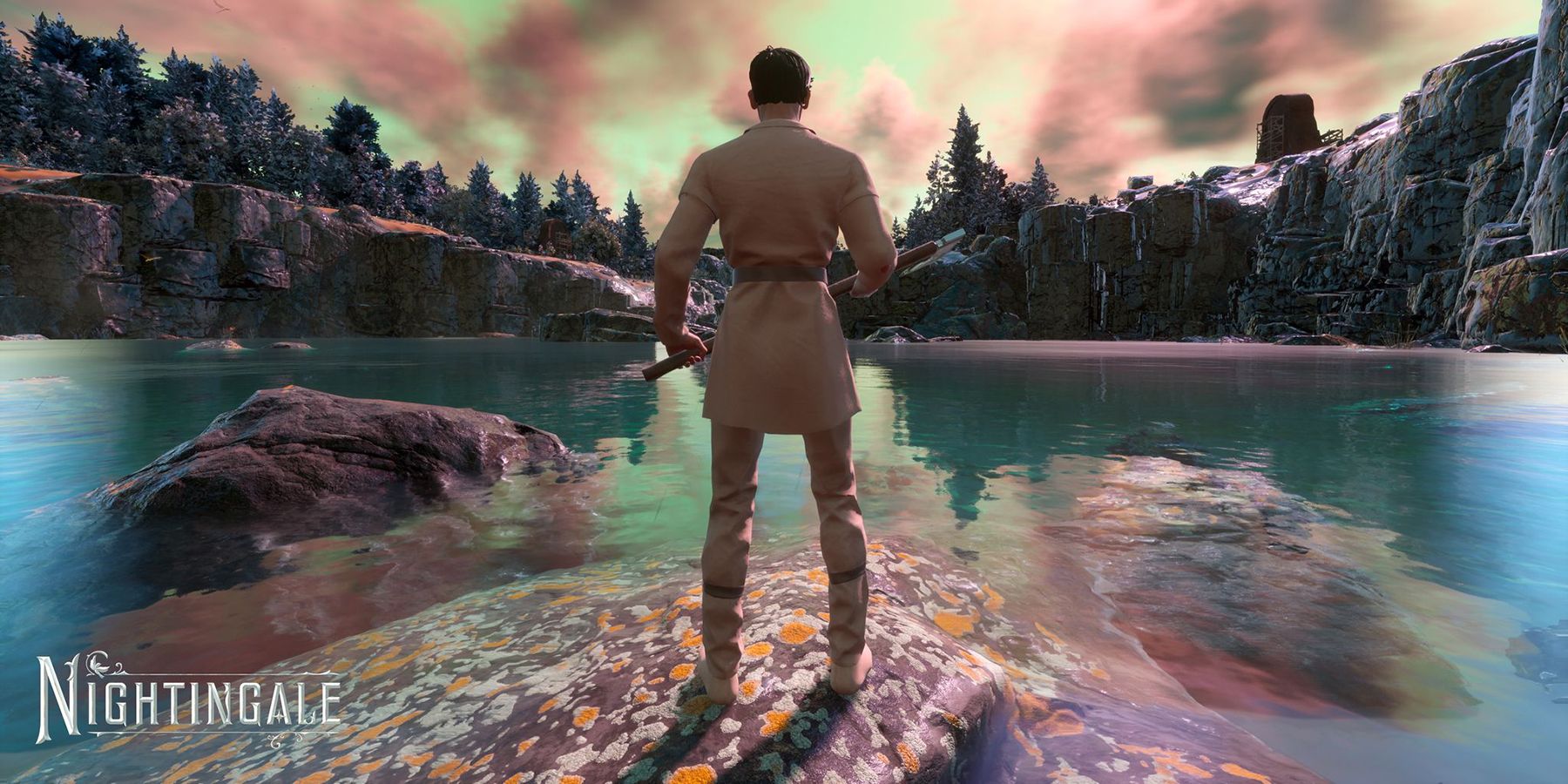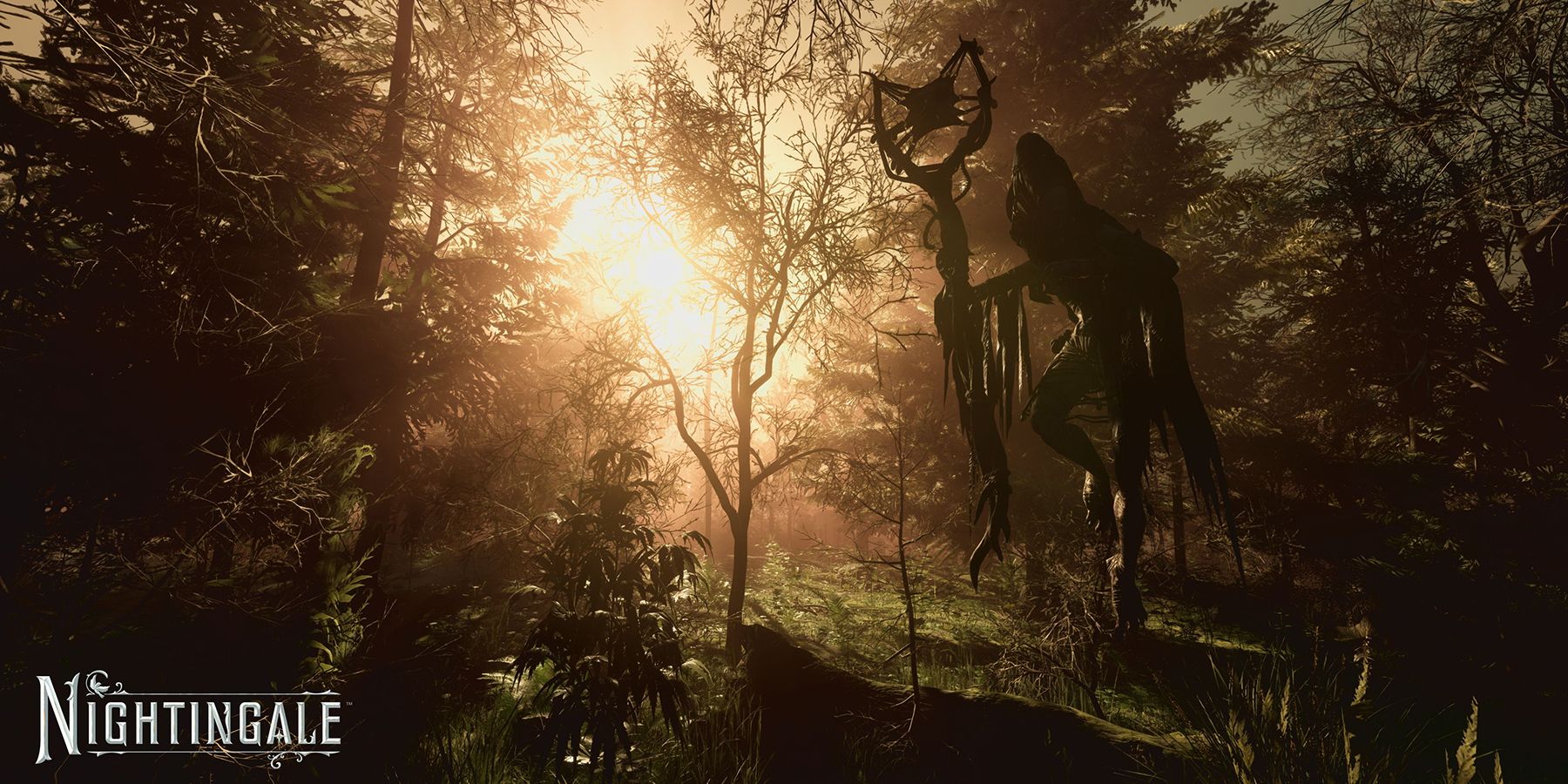Nightingale took the stage at The Game Awards 2022 to show off some new features fans can expect to see in the shared-world survival crafting game when it comes to PC in Early Access next year. This includes subterranean layers included in some of the Realms, the ability to glide with a magical umbrella Mary Poppins-style, and a look at some of the new enemies players will face. Players will be exploring a multitude of realms conjured by Realm Cards, managing their Estate in their designated home realm of sorts, and seeking the human city of Nightingale, after an event called The Pale scatters humanity throughout the various realms.
Game ZXC recently spoke with Inflexion Games' CEO Aaryn Flynn, Director of Production Leah Summers, and Art Director & Head of Audio Neil Thompson about Nightingale's influences, philosophies, and approaches (both to in-game material and its external live-service content such as monetization). The following transcript has been edited for clarity and brevity.
Q: You described the genre as "Victorian Gaslamp." Could you expand on this?
Thompson: So, there are two big genres in Victoriana: Steampunk and Gaslamp Fantasy. Steampunk is more around technology, like walking mechanical men and stuff like this, and that's not something we're particularly interested in.
Gaslamp fantasy is more infused with magic. Technology in our game is obviously a thing, but the ability for humans to interact with the Fae is through magic, through learning and their use of technology to tap into those powers. But we don't have like clockwork robots and stuff like that. It's the magic aspect that makes it Gaslamp fantasy.
We have an ongoing thing where you can't say Steampunk in my presence, and there are absolutely no goggles on top hats in this game, though I am convinced at some point we will offer that.
Q: With games like Bloodborne and Dishonored, it seems Victorian settings have long been popular in the industry. Do you have any thoughts as to why?
Thompson: Yeah, it's interesting, because I think it's become more and more prevalent recently in all forms of entertainment media, really. I think these things go in cycles, right? Everything was sci-fi, then everything was kind of Tolkien-esque medieval fantasy, and maybe it's just the chance for the Victorian age to have a shot. I mean, we didn't pick it because it was popular. We've been doing this for four years. We actually picked it because we were interested in it. We thought it was something a bit novel and a bit more interesting that hadn't been expressed.
Flynn: Yeah, I'll just say, I think it's popular because it represents a time when there are some things that are highly relatable. There are still trains, and there are still some things you recognize—even cars if you go to certain times. I was just watching Enola Holmes with my family, and the headmistress comes in on an old car. They're like, 'oh, a motor vehicle.'
But at the same time, we're so bombarded by technology nowadays that it consumes all our time, and the Victoria era strips all that away. It takes you to a time when there isn't a major war going on, like World War 1 or World War 2, and so you just get to enjoy life. And it's a simpler time, I think, but still has much of the recognizability that you need, and then you add a bit of magic or a bit of fantasy to it. And then it becomes this 'Oh, that's interesting' reaction. Suddenly, I could understand a set of rules in the world but now with the flourish. I think that's its general appeal.
Thompson: Yeah, exploration is so embedded within that consciousness, right? Yeah, search for the origin of the Nile and things like this.
Flynn: The world still had mystery in it too, right? Not everything was discovered, not everything was knowable with a few clicks on a device that you carry around with you. So we created that, and I think we crave that kind of mystery in our lives. We can empathize with the characters who get to discover things and stumble upon things in ways that we don't get to do much anymore.
Q: How difficult has it been balancing some of the distinct elements of Nightingale like the setting, magic, alternate history, literature come to life, and so on?
Thompson: It's not been without its challenges. I think more so what's been really interesting, particularly as we've started to bring players into closed alpha play tests, is finding a balance between what the expectations are of the market that plays survival crafting games and the relatability of those games. And then the fantasy that we're offering in terms of Nightingale and its use of magic and so forth.
Earlier, I think we felt over-indexed more on a relatable experience without bringing all the fantastical elements that we have in the IP to bear on players beyond that initial experience. I think the real journey of this game in the last year has been to really provide that playable experience from moment one so that we can immerse players in that fantasy that we've shown in the trailers, at the last TGA and again this year. I think we make sure players feel that they're immersed in the world of Nightingale. They understand that there's a fantastical world, that magic is there, and that they can really role-play within that, but still have an understanding of the core basics of what survival crafting means and what their expectations are from moment to moment.
Q: With Puck's appearance in Nightingale, how does Shakespeare factor into the alternate history of the Fae?
Thompson: Shakespeare isn't in there specifically, but some of the characters are. It's more the idea that, within our alternate universe, Shakespeare was writing, possibly unknowingly, about real beings. A Midsummer Night's Dream is a big influence in Nightingale, so not only Puck but Oberon, and this idea that the literature of the human past was not necessarily fiction. Or, if it was written as fiction, it might have been based upon stories that were ultimately true at the time and then became warped into fiction.
That's the kind of interplay that we really like. That's why there are real characters and fictional characters, and they can all exist within the same world comfortably because it is that alternative reality. One of the first things we did when we started figuring out the lore of the game, which we did very early on, was to write what we call a historical timeline of events.
We picked a bunch of real events throughout human history starting at the time of Elizabeth I, but then kind of changed them as if there was a Fae influence involved and then worked things down from then, so you could get that influence of the Fae on humanity going down the centuries. And there's that sort of historical element to the lore that provides more depth if players want to get involved in that side of the game. There are opportunities for them to do that through Codex entries and so forth. And they start to learn more about the history of the Fae and humanity and how far it goes back and what those influences have been, which to me is super nerdy. And I love that stuff.
Q: You describe the Fae as a whole as not inherently evil; how would Nightingale's Puck compare to Puck's attitude in A Midsummer Night's Dream?
Thompson: In the play, Puck is more of the Joker right? He's lazy. He's not really a malevolent presence.
Flynn: Yeah, yeah, he's a narrator.
Yeah, he plays pranks, turns someone into a donkey, and bad things happen but not intentionally.
Thompson: Yeah, in Nightingale, Puck is Fae—and he's not. He's a trickster of sorts, but more in a lowkey manner where you don't know why he's giving you the assistance he is. His motivations are inscrutable, and what he is doing is for his own ends. What those ends are, we don't know. Will he turn on you at some point? Will he give you bad advice?
Q: What are the plans for Nightingale's seasonal, live service content?
Summers: Looking into Early Access, we certainly want to make sure that we have lots of great updates for players, whether it's new creatures, characters, quest lines, and things like that. But, you know, I think the part that we're really looking forward to for Early Access is just working with our players.
We've got a bunch of ideas of either new features or things we'd love to see roll out that the team has been excited about. But it really comes down to what is it the players are loving, what do they like to see, what do they want to see more of, and where do they want to see us lean into things. We've just started our closed alpha testing, so we're getting this great sort of feedback loop with our community. By and large, we're hearing that they're really excited about the direction the game is taking. And the nice thing is that we're hearing very clearly what their points of critique are for us and where they want to see the game moving forward.
I think that's just one of the things that, as a dev team the day after a playtest, everyone's like, 'Oh, we've got these great ideas, and we've got these things we want to move forward, can we shuffle these priorities?' I think we're just looking forward to more of that as we go through Early Access.
We always say we want Nightingale to be a place, and we want to bring in those elements that really make people want to connect with our world, stay in our world, and want to be in that kind of magical fantasy that we want to provide people. And so we want to retain that flexibility while still having our own kind of vision and ambition. And that's always a development challenge, for sure, but it is just really nice to hear what's resonating with players and what are the things we got to go fix. Having Early Access is the time that we get to go do that.
Q: What should players expect as far as monetization and microtransactions?
Flynn: Yeah, that's a good question. We don't have any firm plans for anything like that, certainly at the start of the Early Access period. People have asked us if we'll monetize Realm Cards, because it kind of sounds like other games where you'd say, 'oh, I can buy packs of them?' No, it's not, we're not going to do that.
We do sometimes think about if we would ever sell cosmetics. Like, would we ever have things that would be unique outfits or unique things that are strictly cosmetic and would be a skin effectively. We think about those things. As we grow the game, you know, we do think about a Battle Pass. There have been some really interesting evolutions with Battle Passes recently, so we could do something there.
One thing we don't want to do, though, is we don't want to sell content in and of itself. If you look back to the history of the survival crafting genre, a classic approach has been to sell DLC packs where you get a new area, or you get something that is $10 or $15, whatever it is. I think most games are going away from that simply because what it ultimately does is risk dividing your community. There are the people who spent the money and the people who didn't.
And if you and I are playing a game together, Joshua, and you splash out 10 or 15 bucks on it and want me to come along and play, it's hard to balance how I get to come without spending the money. It's either get dragged along, or I just can't play with you. And so we want to make sure that our players can always, always play together. We like the idea of a lot of free content updates. And then where people want to splash out a bit of money and do something there to make their character more unique or something, if that's done fairly and reasonably, then maybe that's the way to go.
But we're very committed to not selling content and giving that content, continuing to update that content like No Man's Sky does, right? Just what a success story, just constantly pushing out great new updates. That should be a real inspiration for a lot of studios of our size.
Q: You talked about the importance of "place" in Nightingale, discussing stuff like no gender-locked clothing, no PvP, and making sure everyone is welcomed in the game. Was this derived from toxicity in gaming or just everyday life? Or where does that inspiration come from for this type of game?
Flynn: I do think it started from a place of wanting to create a safe place for players. I'll tell you this story, Joshua. When we started the studio, my wife asked me the question, 'if you want to do good in the world, why would you go make games?'
I thought long and hard about that, and I was like, 'Yeah, that's a really good question.' And I think, as I asked good friends and colleagues like these folks here and others, the idea that we hit upon is the idea of creating places for people that, you know, need more places. And this became so clear during the pandemic when we used to have many places in our lives. We'd have our home, we'd have our work, and then we'd have places like the coffee shop or the library, you know, places where you go and have a different community of friends. And then we've been losing those places as society's been changing.
We lost our second place, as COVID sent us all home. And so I think the history of games has shown that players love using virtual worlds in games as places, whether that's the old, you know, MUDs from the 80s or 90s, or even MMOs today, like World of Warcraft and others. Players love to invest their time and space and build communities of friends and fellow players in these virtual spaces.
That's what we want to do. We want Nightingale to be a virtual place for people where they can commune, they can express themselves creatively, they can be themselves, and maybe be a little different than they are in the real world. That'd be a good thing. The world needs that, and people need that. We wanted to do that. And that means getting rid of the toxicity, right?
You know, if you were at a coffee shop, your favorite coffee shop, and someone was being loud, obnoxious, and rude, you would expect somebody to deal with that, right? That's why it works because you go into these places trusting that that's not going to happen, right? And yet, we have these virtual spaces where that could totally happen, and you go 'Oh, what's the difference? Like, why? Why should it be this way here?' And it's just because we haven't matured enough and haven't caught up yet in some of these places like this.
Summers: I think the other interesting sort of topic when we were discussing this, absolutely like it is very much in our DNA as a studio that we want to create these things that are inclusive and meaningful in people's lives. And I think when we hit upon this kind of phrase and sentiment of giving players a "place," it was something that very much resonated with who we are as a studio and a culture. So I think that that's really important.
The other one that we really talked about was the idea of a place versus the metaverse. That's a very hot topic, metaverses now, but I think the great thing about places is that you aren't an avatar of yourself, banking. You know, to me, that's boring. I'll bank on my app for now. But when you talk about video games and what they bring to people's lives, and how we can kind of push that forward and contribute to that, the idea of the place felt really, really important. That's why we talk a lot about if we introduce chat, what are some safety features that are important? When we talk about when you play together, it's a high-trust environment. So people you invite should be people that can contribute to your buildings, and you can drop items on the ground for them, and we can create places like that.
I guess it's a philosophy, right? And I think that that's kind of really important and a good contrast to what you would think of when you think of a Metaverse or something along those lines.
Q: What are the plans to deal with potential toxicity in the game, even if there is no PVP?
Flynn: I suppose, Joshua, if we felt people were violating our terms of service, we would just have to remove them from the game. There aren't a lot of ways I could see you doing it, to be honest, because you know, every realm is unique to a player. The only obvious way somebody could grief anybody is if you invited them into your realm, and then they turned out to be a jerk and then just started doing stuff. But we'll probably have to put some controls in to say, 'Get out of my realm.'
So there are things like that we could likely do or should do. But yeah, it's pretty hard to imagine how you might really hurt somebody the way that we have the way our game is fundamentally set up for relationships. But again, if that ever happened, then yeah, we would have to just tell them their band can't play.
Q: To wrap up, I'm curious. What's it like going from a studio like BioWare to working on a more intimate project like Nightingale?
Flynn: Amazing.
Thompson: It's very different. I've been lucky enough throughout my career to work for large studios and small ones right, and there are positives and negatives to both. I think, certainly in my time at Bioware, you're working on these massive franchises like Mass Effect and Dragon Age, but they're not yours, right? You're a custodian in some ways. With those franchises, I think no one really owns them anymore. They're the people's franchises, right?
And there are limits to what you can do within them creatively, to express yourself. I think when we had this opportunity here, it was a blank slate, which is an incredible privilege to happen certainly these days in the gaming industry, to have the opportunity to put the team together as you want it, to design the game as you want it, to build the IP. Those are opportunities that don't come around very frequently. So when they do, you've got to grasp it with both hands.
We've been lucky that we, you know, had sufficient name clout to be able to gain some pretty significant financial backing. I'm not going to say we broke our backs to build our studio.
Flynn: Yeah, no, lots of folks have it way tougher than we do when they bootstrap a studio. Yeah, we didn't. We haven't gone on that journey at all.
Thompson: Yeah, but it's all on us. You know, if Nightingale is successful, fantastic. That will be incredibly exciting. If it's a failure, that's on us too. Because it's our game, and there's no one to blame.
Flynn: Yeah, we can't point fingers anywhere but ourselves.
[END]
Nightingale releases in Early Access in the first half of 2023 for PC.

